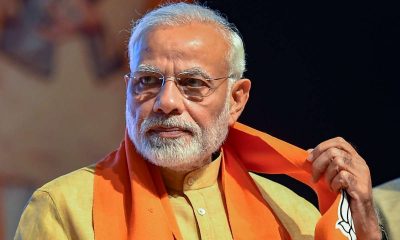World
South Korea demands apology from North Korea

Seoul: South Korean President Park Geun-hye on Monday has asked North Korea to apologise for alleged provocations as emergency contact between the two sides continues.
“Apology and recurrence prevention for any provocative act, including North Korea landmine provocation, is the most important thing,” quoted Park as saying during a meeting with senior presidential secretaries.
Seoul would never yield to Pyongyang though the latter maximises provocations and poses threats to security as seen in the past.
She said “clear apology and recurrence prevention” would be needed to cut off the past repetition of provocations and unstable situations.
Without North Korea’s apology and pledge to prevent recurrence South Korea will continue to broadcast pro-democracy messages with loudspeakers in frontline areas, said Park.
Her comments came amid the ongoing emergency contact between her chief security advisor Kim Kwan-jin and top North Korean leader Kim Jong Un’s chief military aide Hwang Pyong So, which has lasted for more than 19 hours from late Sunday at the border village of Panmunjom.
“South Korea and the US now continue to closely watch the Korean Peninsula’s crisis situation, and are flexibly reviewing the timing of the deployment of US strategic military assets,” Defence Ministry spokesman Kim Min-seok said.
Two South Korean soldiers were maimed on August 4 by the blast of landmines inside the demilitarised zone (DMZ), which Seoul claimed had been deliberately planted by North Korean forces.
On August 10, South Korea resumed blasting propaganda messages into North Korea in response to the landmine blast, and the North Korea called it “a declaration of war”.
World
Lockdowns in China Force Urban Communities to Defy Censorship and Vent Frustration Online

Shanghai’s rich middle class is leading a wave of online dissent over the strict and prolonged lockdowns imposed in various parts of the country. Chinese internet censorship is struggling as patience is wearing thin in many urban centers, coming up with creative forms of online protests.
Social Media Posts Revealing Lockdown Tension in Shanghai
Drawn-out lockdowns are nothing new in China as authorities insist with the nation’s zero-Covid policy since the start of the pandemic. Currently over This time around, however, metropolitan areas like Shanghai are increasingly difficult to keep quiet, given that its more than 25 million residents have seen weeks of total isolation along with food shortages and many other service interruptions.
Dozens of towns and reportedly over 300 million Chinese citizens have been affected by lockdowns of different severity. As expected, urban netizens have been most outspoken over their difficulties by finding creative ways to get around state censorship and bans placed on topics, news comments and spontaneous campaigns.
Shanghai residents have been using mobile proxies and hijacking seemingly unrelated hashtags to talk about healthcare issues, delivery failures and the overall severity of their situation. The “positive energy” that the Chinese government wants to transmit during the recent prolonged series of lockdowns does not come naturally to those counting food supplies and online censors are working hard to filter words, trending topics and undesired social media sharing.
WeChat groups and message threads are under constant monitoring. Posts questioning the zero-Covid approach have been quickly deleted, including by leading Chinese health experts like Dr. Zhong Nanshan. Video footage is soon censored and protests and investigations are quickly made to disappear.
Where this has not worked, officials have exposed banners with warnings and outright threats like “watch your own mouth or face punishment”, while drones have been patrolling the city skies. Yet, if anything, this has led to further tensions and unspoken confrontation with Shanghai’s educated and affluent middle class.
Creative Online Solutions Harnessing Civic Energy
Announcements by Chinese social media that they would be publishing the IP addresses of users who “spread rumors” have not helped either. Tech industry research has shown that much of Asia’s tech-savvy population has a habit of using mobile proxies and other privacy tools, quickly finding workarounds to browse the internet freely and talk to the world about the hottest topics.
The sheer volume of forbidden posts is already a challenge for the very censorship system, experts explain. Unable to track all trending hashtags, state workers overlook topics that speak about the US, Ukraine or other popular news. Linking human rights elsewhere to their situation, Chinese online dissidents establish their informal channels and “hijack” the conversation to share personal or publicly relevant information about the Covid suppression in their town.
Sarcastic and satirical posts still dominate. Others hope to evade the censors by replacing words from famous poems or the national anthem. One thing is certain – social media, when harnessed with the right creativity, has proven its ability to mount pressure on the government in even some of the most strictly controlled tech environments like China.















